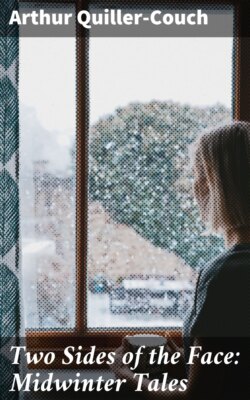Читать книгу Two Sides of the Face: Midwinter Tales - Arthur Quiller-Couch - Страница 12
На сайте Литреса книга снята с продажи.
IX.
ОглавлениеTable of Contents
The hay had been gathered and stacked, and the stacks thatched; and still Roger lived on at Steens unmolested. He began to feel that the danger had blown over, and for this security old Malachi was responsible. Malachi had witnessed the scene in the hayfield, and dreamed for nights after of the look on his master's face. The next time a messenger arrived (he told himself) there would be murder done; and the old man, hazy upon all other points of the law and its operations, had the clearest notion of its answer to murder. He had seen gibbets in his time, and bodies dangling from them in chains.
He began to watch the road for messengers, and never slackened his watch. Six in all he intercepted during the next three weeks and took their papers to carry to his master. It seemed to him to be raining papers. He could not read, and, had he been able, their contents would have conveyed no meaning to him. He burned every one in secret.
It is possible, and even likely, that had they reached Roger they would have had no effect beyond angering him. He believed—as for miles around every man not a lawyer believed—that freehold land which had once descended to an heir could not be alienated without the next heir's consent: nor in all the countryside had such a wrong been perpetrated within living memory. It would have taken twenty lawyers with their books to shake him in this conviction. But it is a fact that he never received a last letter from Lawyer Jose imploring him to appear and fight the suit entered against him, and not to sit in obstinate slumber while his enemies destroyed him.
After this for some weeks the stream of messengers ceased, and even Malachi breathed more freely. He still, however, kept his eye lifting, and was able to intercept the document announcing that in the case of "Stephen versus Stephen," judgment had been entered against the defendant, who was hereby commanded to evade the premises and yield up possession without delay. This also he destroyed.
But there arrived a morning when, as Roger sat at breakfast, the old man came running with news of a gang of men on the road, not six hundred yards away, and approaching the house.
"Are the gates bolted?" asked Roger, rising and taking down two guns from the rack over the chimney-piece.
"Ay, master, bolted and locked." With some vague notion that thereby he asserted possession, Roger had bought new padlocks and clapped them on all three gates—the wrought-iron one admitting to the courtlage, the side wicket, and the great folding-doors of the stable-yard at the back.
"Where's Joseph?"—this was the farm-hind.
"In the challs." [Cattle sheds.]
"Take you this gun and give him the other, and you're to fire on anyone who tries to force the stable gate. They're loaded, the pair of 'em, with buckshot. Now, this fellow,"—he reached down a third gun—"is loaded blank, and here's another with a bullet in him. I'll take these out to the front."
"But, master, 'tis a hanging matter!"
"And I'll hang, and so shall you, before e'er a one o' these scoundrels sets foot in Steens. Go you off quick and tell Joseph, if there's trouble, to let slip the tether of the shorthorn bull."
Roger crammed a powder-flask into one pocket with a handful of wadding, a bag of bullets into another, took his two guns, and went forth into the courtlage, in time to see a purple-faced man in an ill-fitting Dalmahoy wig climb off his horse and advance to the gate, with half a dozen retainers behind him.
He tried the latch, and, finding it locked, began to shake the gate by the bars.
"Hullo!" said Roger. "And who may you be, making so bold?"
"Is your name Roger Stephen?" the purple-faced man demanded.
"I asked you a question first. Drop shaking my gate and answer it, or else take yourself off."
"And I order you to open at once, sir! I'm the Under-Sheriff of Cornwall, and I've come with a writ of ejectment. You've defied the law long enough, Master Stephen; you've brought me far; and, if you've ever heard the name of William Sandercock, you know he's one to stand no nonsense."
"I never heard tell of you," said Roger, appearing to search his memory; "but speaking off-hand and at first sight, I should say you was either half-drunk or tolerably unlucky in your face." And indeed the Under-Sheriff had set out from Truro at dawn and imbibed much brandy on the road.
"Open the gate!" he foamed.
Roger stepped back and chose his gun. "You'd best lead him away quiet," he advised the men in the road. "You won't? Then I'll give the fool till I count three. One—two—three." And he let off his gun full in the Under-Sheriff's face.
The poor man staggered back, clapped his hand to his jaw, and howled; for the discharge was close enough to scorch his face and singe his wig. Also one eyebrow was burnt, and before he knew if he still retained his sight, his horse had plunged free and was galloping down the road with the whole posse in pursuit, and only too glad of the excuse for running.
"Turn loose the bull!" shouted Roger, swinging round towards the house.
The Under-Sheriff found his legs, and bolted for dear life after his horse.
